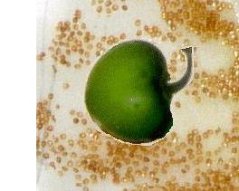
Availability and plant health requirements
Within the European Union, only potato germplasm screened for quarantine diseases can be distributed to fulfill the requirements for an EU plant passport (EC, 1997). Otherwise, the material must pass through a quarantine station.

Within the EU, potato germplasm from CGN will be accompanied by a plant passport. The user is also required to supply a plant passport when distributing this germplasm or derived material to other users within the EU, in accordance with Regulation (EU) 2019/2072 (from November 28, 2019; see page 22). Outside the EU, the limitations are determined by the regulations of the receiving country.
Since 1986, the plants used for seed rejuvenation have been tested for (true-)seed-borne diseases to meet the zero-tolerance requirement.
Distribution
The germplasm is freely distributed in quantities of 50 seeds per sample. However, CGN will only send material once the SMTA has been signed (electronically, by means of the click-wrap procedure).
Users are requested to return their evaluation results to CGN. An embargo on the availability of those results for a limited number of years can be agreed upon.
Subsequent distribution
For subsequent passing (and further subsequent passing) of the (derived) material to other users the SMTA must be used.
If the germplasm was received from CGN under the previous MTA, the user is obliged to explicitly inform the new recipient/institution that they are also bound by the provisions of that MTA (version1998, version20040628) and provide the recipient with all information on that germplasm as supplied by CGN. Following recipients must also be informed by their material donor.
Dormancy
Due to dormancy, it may be difficult to determine germinability within the first two years after regeneration. Therefore, seed samples may be distributed to users even when reliable germination data are not yet available.
The user is advised to treat the seeds with gibberellic acid (see seed regeneration instructions). Because of its seed coat, germinating Solanum lycopersicoides seeds is a special case. See the information on seed treatment from the C.M. Rick Tomato Genetics Resource Center at the University of California (95°F = 35°C).
Additional info on germination methods is available from KEW's <L CODE="C09">Seed Information Database (e.g., search for the genus Solanum).
Timespan seed delivery
Seed delivery within the EU is delayed due to the requirement to request an obligatory Plant Passport from the Dutch Plant Health Service. Once these documents are available, CGN collects the seeds from their storage and sends them to the user. The timespan between the initial request and final delivery should not exceed four weeks.
How to order germplasm
An online search facility is available for accessions that have received a CGN number so far. There, you can select and order the germplasm (click 'Search and request seeds' and select Potato). Only samples that can be freely distributed (screened for quarantine diseases; with sufficient seeds available and good germinability) are included in the regular CGN collections. The 'Procedures' page provides information on the procedures CGN uses for seed distribution.
Disclaimer: All EBN numbers and most of the chromosome numbers are based on general literature reports or countings from other genebanks. The information provided by CGN may contain errors. The users are therefore requested to report back any mistakes in the data of CGN.